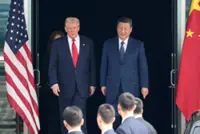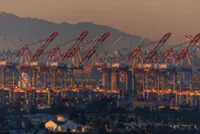KUALA LUMPUR: On April 9, 2025, the global economy was jolted into a new era of uncertainty.
United States (US) President Donald Trump announced an immediate 125% tariff on Chinese imports, alongside a 90-day reprieve for over 75 countries - including Malaysia - where reciprocal tariffs would be capped at 10%.
This was not a routine policy shift. It was a carefully staged disruption - calculated to shake markets, disorient rivals, and reassert dominance - through spectacle.
Hours before, the European Union had voted unanimously to impose 25% counter-tariffs on US goods, in response to renewed American duties on steel and aluminum.
China responded swiftly, raising its own tariffs to 84%, rejecting any notion of submission to economic coercion.
These were not acts of negotiation - they were signals of a fracturing global order. In a span of hours, the institutions, norms, and processes that once governed trade gave way to improvisation and dominance.
The world did not just witness a policy pivot - it watched a system falter.
In the midst of this upheaval, Malaysia held its ground. It did not panic. It did not posture. It paused, assessed, and preserved its room to maneuver.
In doing so, it demonstrated the power of restraint - and the strategic value of composure.
But this moment is not one for passive observation. It is a moment that calls upon Malaysia to move from calm to clarity, from preservation to purpose.
For in the fog of strategic chaos, the ability to define one’s path becomes the ultimate act of sovereignty.
What we are witnessing is not just a trade war - it is the weaponisation of unpredictability. Trump’s governance thrives on confusion, Decisions are made without notice. Institutions are bypassed.
Markets respond not to fundamentals but to signals, gestures, and tweets. Uncertainty is no longer collateral - it is a core instrument of statecraft.
This new reality demands that Malaysia adapt - not by imitating volatility, but by deepening its institutional resilience and strategic posture.
China’s firm response signals more than retaliation - it affirms the logic of strategic dignity. For nations in the Global South, the lesson is clear: Resilience is not a luxury; it is an existential necessity.
Malaysia must now ask not just how to respond, but how to lead. As a country integrated into both the Regional Comprehensive Economic Partnership (RCEP) and the Comprehensive and Progressive Agreement for Trans-Pacific Partnership (CPTPP), and as Asean chair in 2025, Malaysia holds more than a symbolic relevance. It holds the credibility and capacity to convene, mediate, and innovate.
To rise to this occasion, we propose three strategic pathways, not as directives, but as contributions to a national journey already underway.
First, a National Supply Chain Realignment Council to synchronise policy across ministries and states, fast-track approvals for high-value sectors, and attract strategic relocations in semiconductors, electric vehicles, and green industries.
Second, a Trade and Inflation Stabilisation Fund to buffer vulnerable households and small and medium-sized enterprises (SMEs) from price shocks, currency risks, and import disruptions - translating macro foresight into everyday protection.
Third, a regional initiative to establish a multi-currency digital settlement and clearing platform, collaborating with China, Indonesia, the Gulf, and others - not to undermine the dollar, but to foster diversification and shared financial security.
Yet, resilience is not only institutional - it must be lived. That is why we propose a public-facing framework: a Rakyat’s Hope Engine, designed to translate national strategy into people’s confidence, which includes a Resilience Support Scheme to ensure essentials remain affordable for B40 and M40 families; a Youth Green Transition Fund to build skills and create pathways in future industries and a SME Export Pivot Programme to help local firms expand market reach and financing access.
These initiatives are not promises - they are signals of intent. They embody a state that not only sees the storm, but prepares its people for it. In a time of fragmentation, the most powerful force a country can project is coherent direction.
Domestically, this is not the moment for division. No political party, whether in government or opposition, should mistake external turbulence as an opportunity for internal disruption. National hardship must never become electoral capital.
To remain credible abroad, Malaysia must remain coherent at home. Strategic unity is not about silencing dissent - it is about recognising that leadership requires maturity, especially in moments that test a nation’s nerve.
Ultimately, what is being contested is not merely market share or tariffs - it is the right of nations to choose their development paths.
The US seeks to reassert dominance through disruption. China defends autonomy through defiance. And Malaysia stands between them - not as a bystander, but as a builder.
We are not here to pick sides. We are here to hold space, offer platforms, and propose balance.
We may not control the global winds, but we can choose our direction, refine our posture, and strengthen our compass.
Let it be remembered that when the tides of uncertainty rose, Malaysia chose clarity - not confusion but composure, not chaos but strategy. Not silence. - Bernama
CW Sim is a Senior Fellow of Strategic Pan Indo Pacific Arena (SPIPA).





